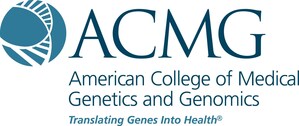
BETHESDA, Md., March 16, 2021 /PRNewswire/ -- Using DNA-based health screening to guide preventive care has long been discussed but, until recently, has had limited applications. While DNA technologies now make primary screening applications newly possible in a wide range of settings, the World Health Organization's (WHO) principles and practices that guide health screening have been established since 1968.
In an effort to provide practical guidance regarding the use of DNA-based screening to improve population health, the American College of Medical Genetics and Genomics (ACMG) has released "DNA-based screening and population health: a points to consider statement for programs and sponsoring organizations from the American College of Medical Genetics and Genomics (ACMG)."
The statement focuses on issues related to implementation strategies for DNA-based screening, which requires distinguishing "screening" from the DNA-based "diagnostic testing" that has been applied within healthcare for decades. In DNA-based diagnostic testing, the individual is offered testing because of a health concern and therefore has an increased chance of a positive genetic test compared to most people. In contrast, the goal of DNA-based screening is to offer a test to everyone in order to identify persons without prior suspicion of a genetic risk for disease development.
"DNA-based screening is clearly capable of making visible some health risks that would otherwise be invisible. There are long established 'principles and practices' that are relevant to all health screening, and this statement puts this new screening opportunity in the context of these principles and practices in order to help guide any organization seeking to improve health by offering DNA-based screening," said lead author Michael F. Murray, MD, FACMG, FACP.
A few of the specific points to consider include:
- DNA-based screening should not replace a standard-of-care evaluation for individuals with a clinical indication for diagnostic assessment. Individuals who need DNA-based diagnostic testing would be ill-served by a limited DNA-based screening approach.
- Uninterpretable DNA variants known as "variants of uncertain significance (VUS)" do not constitute a reportable disease risk in screened individuals.
- DNA-based screening should be linked to opportunities for evidence-based risk-reducing clinical care. The risk-reducing clinical follow up for this screening should be consistent with best practices outlined by professional societies with appropriate expertise.
- Organizations involved in DNA-based screening should share the outcomes-related data with the goal of improving our collective knowledge so that human health can be improved with this screening.
- Over time those DNA-based screening applications with proven beneficial clinical outcomes should be made available to entire populations to promote healthcare equity and limit health disparities.
The statement concludes that if DNA-based screening is to improve population health, then it must be combined with effective risk-reducing clinical care. The implementation of evolving management guidelines will require:
- periodic re-analysis of DNA variants informed by updated databases,
- periodic clinical re-evaluation of disease status in at-risk individuals, and
- periodic assessment of the effectiveness of strategies that support implementation of DNA-based screening and subsequent clinical management.
About the American College of Medical Genetics and Genomics (ACMG) and ACMG Foundation
Founded in 1991, the American College of Medical Genetics and Genomics (ACMG) is the only nationally recognized medical professional organization solely dedicated to improving health through the practice of medical genetics and genomics, and the only medical specialty society in the US that represents the full spectrum of medical genetics disciplines in a single organization. The ACMG is the largest membership organization specifically for medical geneticists, providing education, resources and a voice for more than 2,400 clinical and laboratory geneticists, genetic counselors and other healthcare professionals, nearly 80% of whom are board certified in the medical genetics specialties. ACMG's mission is to improve health through the clinical and laboratory practice of medical genetics as well as through advocacy, education and clinical research, and to guide the safe and effective integration of genetics and genomics into all of medicine and healthcare, resulting in improved personal and public health. Four overarching strategies guide ACMG's work: 1) to reinforce and expand ACMG's position as the leader and prominent authority in the field of medical genetics and genomics, including clinical research, while educating the medical community on the significant role that genetics and genomics will continue to play in understanding, preventing, treating and curing disease; 2) to secure and expand the professional workforce for medical genetics and genomics; 3) to advocate for the specialty; and 4) to provide best-in-class education to members and nonmembers. Genetics in Medicine, published monthly, is the official ACMG journal. ACMG's website, http://www.acmg.net offers resources including policy statements, practice guidelines, educational programs and a 'Find a Genetic Service' tool. The educational and public health programs of the ACMG are dependent upon charitable gifts from corporations, foundations and individuals through the ACMG Foundation for Genetic and Genomic Medicine.
Kathy Moran, MBA
[email protected]
SOURCE American College of Medical Genetics and Genomics







Share this article